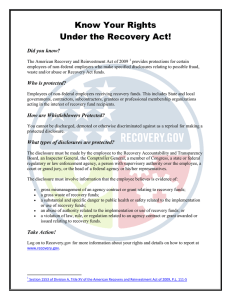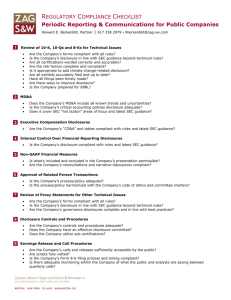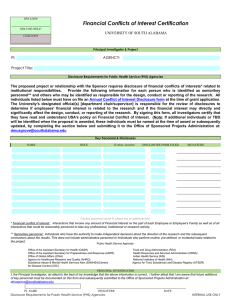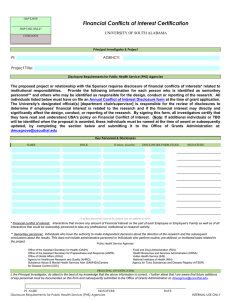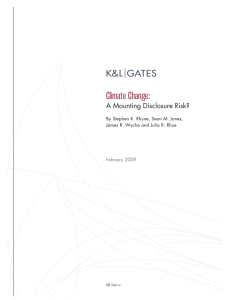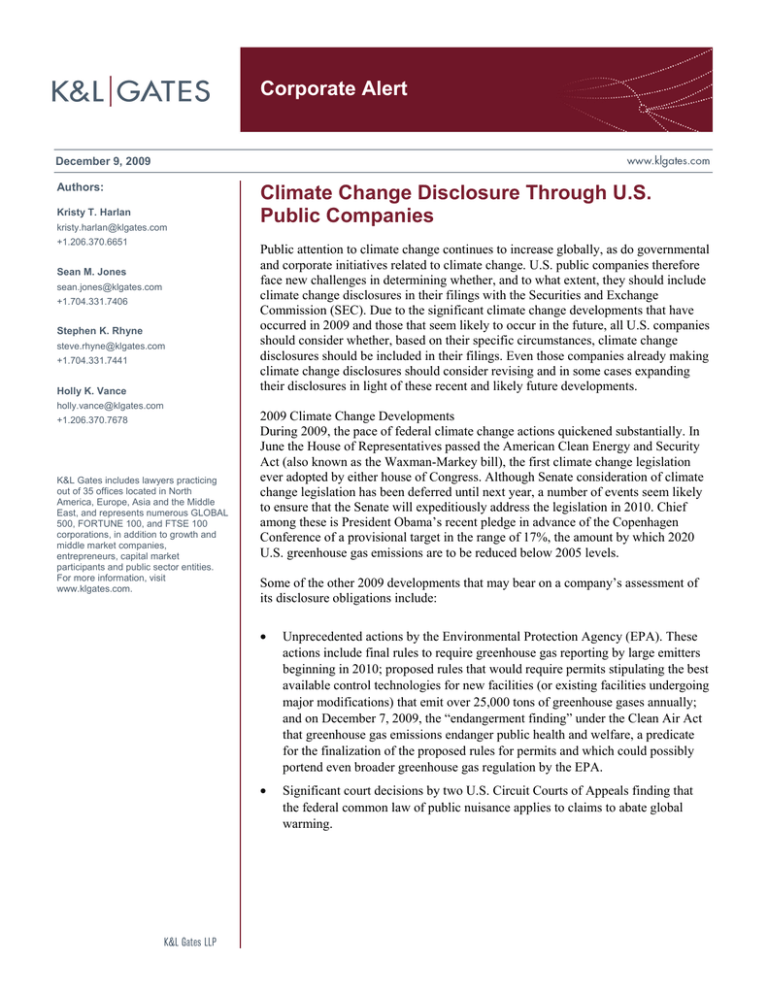
Corporate Alert
December 9, 2009
Authors:
Kristy T. Harlan
kristy.harlan@klgates.com
+1.206.370.6651
Sean M. Jones
sean.jones@klgates.com
+1.704.331.7406
Stephen K. Rhyne
steve.rhyne@klgates.com
+1.704.331.7441
Holly K. Vance
holly.vance@klgates.com
+1.206.370.7678
K&L Gates includes lawyers practicing
out of 35 offices located in North
America, Europe, Asia and the Middle
East, and represents numerous GLOBAL
500, FORTUNE 100, and FTSE 100
corporations, in addition to growth and
middle market companies,
entrepreneurs, capital market
participants and public sector entities.
For more information, visit
www.klgates.com.
Climate Change Disclosure Through U.S.
Public Companies
Public attention to climate change continues to increase globally, as do governmental
and corporate initiatives related to climate change. U.S. public companies therefore
face new challenges in determining whether, and to what extent, they should include
climate change disclosures in their filings with the Securities and Exchange
Commission (SEC). Due to the significant climate change developments that have
occurred in 2009 and those that seem likely to occur in the future, all U.S. companies
should consider whether, based on their specific circumstances, climate change
disclosures should be included in their filings. Even those companies already making
climate change disclosures should consider revising and in some cases expanding
their disclosures in light of these recent and likely future developments.
2009 Climate Change Developments
During 2009, the pace of federal climate change actions quickened substantially. In
June the House of Representatives passed the American Clean Energy and Security
Act (also known as the Waxman-Markey bill), the first climate change legislation
ever adopted by either house of Congress. Although Senate consideration of climate
change legislation has been deferred until next year, a number of events seem likely
to ensure that the Senate will expeditiously address the legislation in 2010. Chief
among these is President Obama’s recent pledge in advance of the Copenhagen
Conference of a provisional target in the range of 17%, the amount by which 2020
U.S. greenhouse gas emissions are to be reduced below 2005 levels.
Some of the other 2009 developments that may bear on a company’s assessment of
its disclosure obligations include:
•
Unprecedented actions by the Environmental Protection Agency (EPA). These
actions include final rules to require greenhouse gas reporting by large emitters
beginning in 2010; proposed rules that would require permits stipulating the best
available control technologies for new facilities (or existing facilities undergoing
major modifications) that emit over 25,000 tons of greenhouse gases annually;
and on December 7, 2009, the “endangerment finding” under the Clean Air Act
that greenhouse gas emissions endanger public health and welfare, a predicate
for the finalization of the proposed rules for permits and which could possibly
portend even broader greenhouse gas regulation by the EPA.
•
Significant court decisions by two U.S. Circuit Courts of Appeals finding that
the federal common law of public nuisance applies to claims to abate global
warming.
Corporate Alert
•
Significant support by many members of the
business community for greater governmental
and corporate efforts to reduce greenhouse gas
emissions. Walmart announced in July 2009, for
example, that it was requiring sustainability
reports by its suppliers (over 100,000 globally)
so that Walmart can begin developing
sustainability ratings for its products.
•
The SEC staff, in a reversal of its prior position,
issued a bulletin on October 27, 2009, that is
expected to facilitate and encourage shareholder
proposals to require companies to provide
greater disclosure about their climate change
risks.
In addition, investor groups continued to press in
2009 for improved climate change disclosure in SEC
filings. In June, members of the Investor Network on
Climate Risk and other large global investors sent a
letter to the SEC Chairman requesting that the SEC
issue formal interpretive guidance on the materiality
of risks posed by climate change and enforce
existing disclosure requirements for climate change
risks. On November 23, 2009, a group of investors,
including the California Public Employees’
Retirement System, filed a supplemental petition
with the SEC asking it to provide interpretive
guidance outlining climate-related material risks that
public companies should disclose to investors.
SEC Commissioner Elisse Walter stated in several
public comments in October 2009 that the SEC staff
is reviewing recommendations about such guidance
and that in her view the SEC should consider issuing
such guidance. Commissioner Walter in her public
comments also observed: “Even without any further
guidance, however, it strikes me that this is one area
where, if I were drafting disclosure for a registrant
today, I would carefully consider whether that
company’s particular facts and circumstances raise
any disclosure obligations under the current rules,
and in particular, under the MD&A requirements.”
Current SEC Disclosure Requirements
Even without any specific guidance, existing SEC
disclosure rules and regulations, as noted by
Commissioner Walter, bear on a company’s climate
change disclosure obligations. Registration
statements filed under the Securities Act of 1933 and
periodic reports filed under the Securities Exchange
Act of 1934 must disclose all information that is
material to an investment decision. In addition, Rule
10b-5 provides that it is unlawful to make an untrue
statement of material fact or to omit to state a
material fact necessary to make the statements, in
light of the circumstances under which they are
being made, not misleading in connection with the
purchase or sale of a security.
The touchstone for determining whether disclosure
is required under SEC rules is materiality—whether
there is a substantial likelihood that a reasonable
investor would consider the information important
in making his or her investment or voting decision.
Whether omitted information is material is
determined on the basis of whether there is a
substantial likelihood that the disclosure of the
omitted fact would have been viewed by a
reasonable investor as having significantly altered
the “total mix” of information available. The
materiality of contingent or speculative events such
as proposed climate change legislation is to be
assessed by balancing the probability of an event
occurring against its anticipated magnitude to the
company.
The provisions of Regulation S-K more specifically
prescribe the subject matter of certain items
required to be disclosed in SEC filings. Several of
these rules may require a company to address
climate change-related issues, particularly Item 303
governing a company’s Management Discussion &
Analysis (MD&A). Item 303 requires that a
company describe in its MD&A any known “trends,
uncertainties or other factors” that are reasonably
likely to affect the company’s earnings, liquidity or
capital expenditures. Item 303 is intended to allow
investors to view the company through the eyes of
management and create increased transparency.
Specifically, forward-looking information is
required in the MD&A where there are known
“trends, uncertainties or other factors” that will
result in, or that are reasonably likely to result in, a
material impact on the company’s liquidity, capital
resources, revenues and continuing operations. The
SEC has repeatedly stressed the importance of
addressing factors that are likely to impact a
company’s business in the future.
December 9, 2009
2
Corporate Alert
Other Items in Regulation S-K may apply to a
company as it considers climate change disclosures,
including the following:
•
•
•
•
Item 101(c)(x) requires a company to disclose
competitive conditions in its business. For some
companies, sustainability performance may have
a material impact on competitive conditions, and
therefore require disclosure.
Item 101(c)(xii) requires a company to disclose
any material effect of environmental compliance
associated with enacted laws. The cost of
complying with any adopted greenhouse gas
emissions regulations is the type of cost, if
material, required to be disclosed in Item
101(c)(xii).
Item 103 requires disclosure of any material
pending administrative or judicial proceeding to
which a company is, or may become, a party. In
addition, any such proceeding arising under any
laws regulating the discharge of materials into
the environment or primarily for the purpose of
protecting the environment must be described if
it falls within certain parameters specified in
Item 103. In addition, a company should focus
not only on any proceeding to which it is a party
but on any third party proceedings if the
outcome could materially affect the company’s
financial condition or competitive position. As
noted, two federal circuit court decisions have
ruled that plaintiffs, relying on federal common
law of public nuisance and other common law
tort theories, have standing to pursue causes of
action against defendants that have emitted
greenhouse gases (for a further discussion of
these decisions, see “Emissions of Greenhouse
Gases & Global Warming—Regulation through
Litigation? Who is Liable for Damages Arising
from Global Warming?”).
Item 503 requires a discussion of significant risk
factors that apply to a company. Companies
with businesses that may be impacted by climate
change or climate change-related regulation
should consider including appropriate disclosure
addressing these risks and their potential effect
on the company.
•
In addition, Regulation FD prohibits certain
selective disclosures of material nonpublic
information. Consequently, disclosure of
material climate change information to third
parties may violate Regulation FD if not also
disclosed by the company in an SEC filing.
Considerations in Evaluating
Disclosure
Against this backdrop of SEC disclosure rules, a
corporation should consider what climate change
disclosures may be appropriate in its SEC filings.
To do so, a corporation should analyze the ways in
which it is impacted, and is expected in the future to
be impacted, by climate change and its
consequences. If the effects of climate change and
its consequences are expected to be material to the
corporation’s operations, financial condition or its
business, then disclosure is required.
A corporation’s analysis of the impact of climate
change should consider several general factors
applicable to a broad range of companies, as well as
factors more specific to the corporation’s particular
circumstances. These general factors will include
the possible actions that may emanate from the
Copenhagen Conference, both in the U.S. as well as
other countries and regions key to the corporation’s
business. For U.S. companies, the prospect of
federal legislation and its potential consequences, as
well as actions by the EPA, will be critical
considerations in evaluating whether climate change
disclosures are necessary. These consequences are
expected to affect energy costs, building standards,
land use practices, various regulatory regimes, and
even the availability and costs of raw materials in
some cases.
A company also should consider the state statutory
and regulatory schemes in the states in which it
operates. A number of states already have adopted
various climate change measures, including
renewable portfolio standards, greenhouse gas
inventorying, green building standards and multistate compacts to limit greenhouse gas emissions.
Some states, such as California, have been
particularly active in adopting climate change
measures.
December 9, 2009
3
Corporate Alert
A company should consider whether any of its
strategic locations are expected to be impacted by
the physical or climatic effects of climate change.
For example, are any of these locations vulnerable to
climate change events, such as flooding and
hurricanes, and, if so, will an increase in such events
result in higher insurance costs and local taxes?
The nature of a company’s industry, of course, is
another key factor, and corporations should
generally be mindful of what disclosures are being
made by others in their industry. Climate change is a
critical matter for electric utilities, energy producers,
energy-intensive companies and the insurance
industry. Other industries, of course, are also
impacted. Companies in consumer-oriented
industries increasingly have been promoting their
“green” efforts, recognizing the importance of the
issue to many members of the public. As noted,
Walmart announced this July that its suppliers must
provide sustainability reports about their products
and supply chains.
When analyzing the impact of climate change, a
company should not overlook that climate change
and its consequences may present opportunities and,
if material, these opportunities should be disclosed.
This would be true for cleantech and energy
efficiency companies, but can also be true in other
circumstances such as when superior sustainability
performance may provide a company a competitive
advantage.
Lastly, as part of its analysis, a company should be
aware of what it has already disclosed regarding
climate change in its SEC filings and other public
climate change disclosures, such as on a website, in
responses to questionnaires, through interviews, or
through participation on panels. A company will
generally want to ensure that it is consistent in its
disclosures and, regardless, will not want to be
“selectively disclosing” material climate change
information through certain channels without
including it in SEC filings.
Anchorage Austin Beijing Berlin Boston Charlotte Chicago Dallas Dubai Fort Worth Frankfurt Harrisburg Hong Kong London
Los Angeles Miami Moscow Newark New York Orange County Palo Alto Paris Pittsburgh Portland Raleigh Research Triangle Park
San Diego San Francisco Seattle Shanghai Singapore Spokane/Coeur d’Alene Taipei Tokyo Washington, D.C.
K&L Gates includes lawyers practicing out of 35 offices located in North America, Europe, Asia and the Middle East, and represents numerous
GLOBAL 500, FORTUNE 100, and FTSE 100 corporations, in addition to growth and middle market companies, entrepreneurs, capital market
participants and public sector entities. For more information, visit www.klgates.com.
K&L Gates is comprised of multiple affiliated entities: a limited liability partnership with the full name K&L Gates LLP qualified in Delaware and
maintaining offices throughout the United States, in Berlin and Frankfurt, Germany, in Beijing (K&L Gates LLP Beijing Representative Office), in
Dubai, U.A.E., in Shanghai (K&L Gates LLP Shanghai Representative Office), in Tokyo, and in Singapore; a limited liability partnership (also named
K&L Gates LLP) incorporated in England and maintaining offices in London and Paris; a Taiwan general partnership (K&L Gates) maintaining an
office in Taipei; a Hong Kong general partnership (K&L Gates, Solicitors) maintaining an office in Hong Kong; and a Delaware limited liability
company (K&L Gates Holdings, LLC) maintaining an office in Moscow. K&L Gates maintains appropriate registrations in the jurisdictions in which its
offices are located. A list of the partners or members in each entity is available for inspection at any K&L Gates office.
This publication is for informational purposes and does not contain or convey legal advice. The information herein should not be used or relied upon
in regard to any particular facts or circumstances without first consulting a lawyer.
©2010 K&L Gates LLP. All Rights Reserved.
December 9, 2009
4

